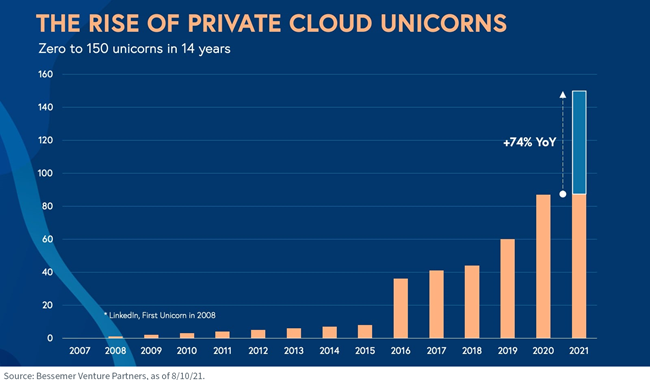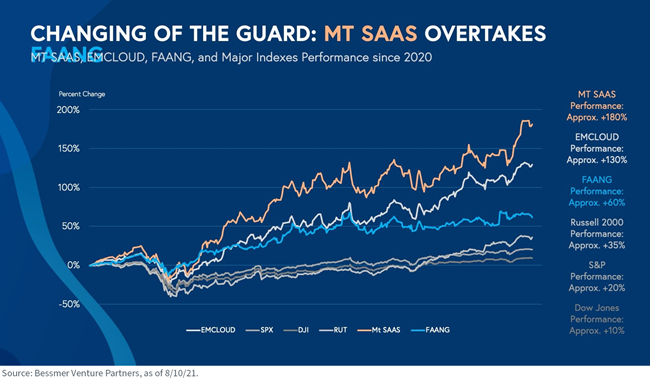Key Takeaways from the Cloud 100


For six years, Bessemer Venture Partners, along with Forbes and Salesforce Ventures, have published the Cloud 100, which ranks the top 100 private cloud companies.
The publication of the list is generally viewed as a landmark event for the cloud industry, providing participants with deep insights into the growth and innovation in progress on the private side of the cloud computing market.
The Cloud 100 is a topical reveal to WisdomTree because it provides data points and anecdotes about the state of today’s private cloud market. Developments on the private side have the potential to impact the public side that our WisdomTree Cloud Computing Fund (WCLD) provides exposure to. So, we monitor the list and information in Bessemer’s reports.
Below we detail some of the key takeaways from this year’s event.
2021 Cloud 100—A List of Unicorns
- In 2021, every company on the Cloud 100 list has at least a $1 billion valuation—companies meeting this threshold are referred to affectionately as “unicorns.” For reference, 87% of last year’s list were unicorns. This is evidence that the appetite for strong cloud computing businesses continues to grow.
- The cumulative value of the 2021 Cloud 100 is $518 billion, a 94% year-over-year (YoY)increase from $267 billion. That aggregate valuation is greater than the individual gross domestic product (GDP) of 87% of the world’s countries! The average company on the list is valued at $5.2 billion, which is more than double the 2020 average of $2.5 billion.
- Since the first Cloud 100 in 2016, the value of the list has increased five times over. The average Cloud 100 valuation has grown by $4.1 billion at a 38% CAGR since 2016, from $1.1 billion in 2016 to $5.2 billion today.

The Cloud Industry’s Accelerating Growth
- The average revenue growth rate on the list was 90% YoY, which compares to 80% in 2020. The top quartile of companies on the list grew 110% YoY, which is faster than ever, according to Bessemer.
The Public Cloud Market and IPOs since the 2020 Cloud 100
- 19 of last year’s Cloud 100 list are now—or are in the process of becoming—publicly traded companies.
- A meaningful portion of today’s public cloud market consists of former Cloud 100 constituents. Of the 57 constituents of the BVP Nasdaq Emerging Cloud Index, which the WisdomTree Cloud Computing Fund is designed to track, 26 are Cloud 100 graduates. Bessemer estimates that these 26 companies contribute over $590 billion of public cloud market capitalization.
Evaluating Bessemer’s 2020 Predictions
- At last year’s event, Bessemer predicted that 1) public cloud markets would surpass $2 trillion in cumulative market capitalization, and 2) the entire Cloud 100 would consist of companies with at least a $1 billion valuation.
- Prediction 1: As of July 2021, the public cloud market reached $2.3 trillion, not only achieving but well surpassing Bessemer’s prediction.
- Prediction 2: As mentioned, the entire Cloud 100 list consists of unicorns with at least $1 billion valuations.
Cloud Globalization
- International representation on the list continues to expand, to nearly 30%. Ireland, Germany, Israel and Australia are a few of the countries on this year’s list. Bessemer also continues to see cloud leaders rising in Asia Pacific, Indian and other international markets.
- In Bessemer’s view, the cloud industry will have a sizeable impact on global GDP over the coming years.
Cloud Job Growth
- According to Bessemer, Cloud 100 companies increased their number of employees by an average of 26% since January 2021, equating to a total of more than 17,000 new hires. The fintech industry created the greatest number of new jobs year-to-date.
Top Cloud 100 Subsectors
- Fintech companies on the list experienced the strongest growth, increasing 461% in value since the 2019 list. This subsector has a cumulative $146 billion valuation, which is more than a quarter of the list’s total value.
- According to Bessemer, cloud companies within the fintech subsector are helping modernize the infrastructure that the financial services industry relies on. Many of today’s cloud companies embed financial services and payments within their software solutions. For example, Cloud 100 constituent Toast offers an all-in-one point-of-sale and restaurant management platform for restaurants. In Bessemer’s view, cloud companies like Toast are often able to process payments and payroll more efficiently than many traditional banks.
- Data and Infrastructure businesses also had more representation, increasing 70% in value from the 2019 list. Today this subsector makes up $63 billion of the list’s value.
- There is valuation concentration at the top of the list. The top 10 companies on the list amount to approximately $200 billion, or 38% of the list’s cumulative value.
New Market Leaders—MT SAAS vs. FAANG
- Last year, Bessemer introduced a competitor for the well-known FAANG basket (Facebook, Amazon, Apple, Netflix, Google) with cloud giants encompassed by their MT SAAS basket (Microsoft, Twilio, Salesforce, Amazon, Adobe, Shopify).
- According to Bessemer, MT SAAS performance represents the power of the cloud and how it will continue to drive technology and innovation in the future. In 2020, MT SAAS outperformed FAANG by over 100%.
For definitions of indexes in the chart, please visit our glossary.

Final Thoughts
Bessemer Venture Partners has one of the largest cloud portfolios in venture capital and the insights they provide in the Cloud 100 and other published research may serve as a resource to gauge the status of the broader cloud economy.
Year-to-date 2021 has presented a more challenging return environment for the public cloud market as measured by the performance of the WisdomTree Cloud Computing Fund. The Fund has returned 10.0% in 2021 so far in comparison to 57.1% at this point last year1. (Please click here for Standardized Fund Performance).
Given the massive catalyst that the COVID-19 pandemic provided for cloud computing businesses, it is not surprising that 2020 is a tough year-over-year comparison to beat.
Nonetheless, we exit the Cloud 100 event with reinforced confidence in the potential growth trajectory of the cloud industry, based on three key takeaways: 1) cloud technology is a necessity for businesses to survive and compete in today’s economy, 2) the cloud industry is a meaningful contributor to global GDP and employment growth, 3) revenue growth rates in the private cloud market continue to accelerate and provide evidence that we remain firmly in a historic period for cloud technology adoption.
You may watch or read through the entire event on Bessemer’s site here.
1Source: Wisdomtree, for the periods 12/31/20–8/9/21 and 12/31/19–8/9/20. Performance at NAV.
Important Risks Related to this Article
The WisdomTree Cloud Computing Fund (WCLD), through a collaboration with Nasdaq, leverages the expertise of Bessemer Venture Partners (BVP), a leading venture capital investor in cloud-based businesses with more than a decade of investment success in the cloud computing industry. BVP is not affiliated with WisdomTree Asset Management. WisdomTree makes no representations, warranties, endorsements or recommendations regarding BVP, any BVP data, methodology or related information, or any strategy or security. The user of this and BVP information assumes the entire risk of any use made of the information provided herein. The opinions, interpretations or findings expressed herein do not necessarily represent the views of WisdomTree or any of its affiliates.
There are risks associated with investing, including the possible loss of principal. The Fund invests in cloud computing companies, which are heavily dependent on the Internet and utilizing a distributed network of servers over the Internet. Cloud computing companies may have limited product lines, markets, financial resources or personnel and are subject to the risks of changes in business cycles, world economic growth, technological progress and government regulation. These companies typically face intense competition and potentially rapid product obsolescence. Additionally, many cloud computing companies store sensitive consumer information and could be the target of cybersecurity attacks and other types of theft, which could have a negative impact on these companies and the Fund. Securities of cloud computing companies tend to be more volatile than securities of companies that rely less heavily on technology and, specifically, on the Internet. Cloud computing companies can typically engage in significant amounts of spending on research and development, and rapid changes to the field could have a material adverse effect on a company’s operating results. The composition of the Index is heavily dependent on quantitative and qualitative information and data from one or more third parties and the Index may not perform as intended. Please read the Fund’s prospectus for specific details regarding the Fund’s risk profile.


